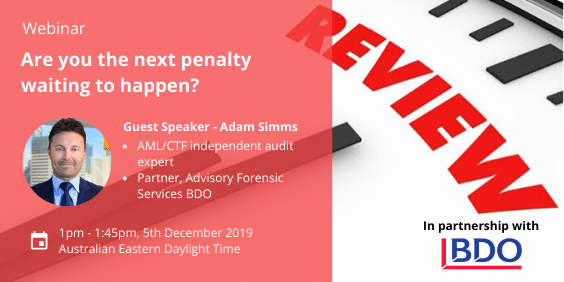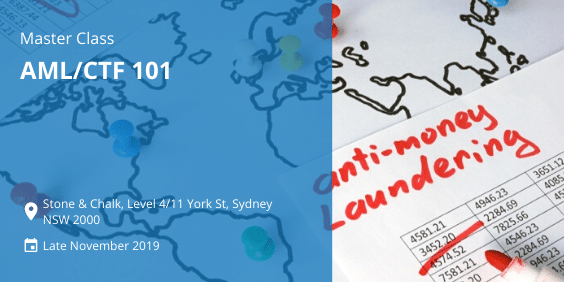Newsletter – 13 November 2019
What we’re hearing…
Welcome to the November edition of our newsletter. Last month we provided some early insights from our AML Pulse survey. As a reminder the survey was designed to help regulated entities understand gaps in their AML Programs and ML/TF Risk Assessments, and responses from 12 industry groups spanning 10 countries were received. This month we dig deeper into the results and reveal further findings.
Most worrisome was that 48% of respondents indicated they do not assess the existence and effectiveness of mitigating controls. The basic fundamentals of risk assessment are just that – basic. Your inherent risk represents the amount of risk that exists in the absence of controls. Residual risk is the amount of risk that remains after controls are accounted for. How can you understand your residual risk if your don’t assess the existence and effectiveness of mitigating controls?
Now, for the other key findings:
Gaps & weakness are going undetected and those detected are potentially neglected.
- 35% of respondents hadn’t had an independent review of their AML/CTF program in the last 12 months; and 49% still have open issues, actions or risks resulting from the last independent review of their AML/CTF program
Inherent Risk Ratings under baked.
- 24% of respondents don’t include an inherent risk assessment of customers in the ML/TF risk assessment;
- 15% of respondents don’t include an inherent risk assessment of channels by which customers access their products and services in the ML/TF risk assessment (which is a mandatory requirement btw!); and
- 18% of respondents don’t include an inherent risk assessment of the countries in which their customers are located, business operations are located, or their related third parties are based in the ML/TF risk assessment (which is also another mandatory requirement btw, just saying!)
Staff key to defence not adequately prepared.
- 32% of respondents don’t require staff in higher risk roles to undertake additional and more frequent AML/CTF risk awareness training and 47% don’t clearly describe the scope, timing and frequency of pre and post employment screening activities in the AML/CTF Program
Important customer behaviour potentially going unnoticed.
- 35% of respondents don’t clearly describe a process to review business rules and monitoring scenarios to determine whether these remain effective in monitoring customer behaviour and transaction activities
The AML Pulse Check survey provided a window into just some of the challenges faced by regulated entities and areas that could be improved and you can’t help but wonder why on earth having a mandatory independent review of AML Programs every two years has not already been mandated or adopted.
It is clear to me that the level of understanding of money laundering risks and control frameworks across a large number of industry sectors is completely inadequate 13 years after the regulations came into effect and regulators have to stand up and take responsibility for not getting the message across, for not mandating independent reviews and for tolerating large scale non-compliance in relation to AML risk assessments and AML Programs.
If you would like to discuss how your business can improve ML/TF risk management processes then please get in touch.
– Anthony Quinn, CEO and Founder, Arctic Intelligence
News in brief
FATF published its updated list of jurisdictions identified as having “strategic deficiencies” in their anti-money laundering and combating the financing of terrorism (AML/CFT) regimes. Read more.
AUSTRAC released the Mutual Banking Sector Risk Assessment report which concluded the mutual banking sector has a high level of vulnerability to financial crime. Read more.
The AML/CTF and Other Legislation Amendment Bill was introduced into Australian Federal Parliament on the 17th October 2019. The specific amendments in the bill include customer due diligence, correspondent banking obligations and Cross-border reporting requirements. Read more.
A supersized mansion and a residential development in Melbourne’s east are among $17.3 million worth of assets seized as part of an Australian Federal Police investigation into Chinese nationals allegedly laundering proceeds of crime. Read more.
A Melbourne man who laundered $4.6 million through a bogus meat exporting business and whose deposits formed part of AUSTRAC’s money laundering case against Commonwealth Bank of Australia faces deportation after serving jail time. Read more.
Westpac misconduct costs head toward $2 billion as it faces heavy AUSTRAC penalties over its failure to report “a large number” of International Funds Transfer Instructions. Read more.
The European Banking Authority has published its Work Programme for 2020, outlining plans to prioritise anti-money laundering (AML) and moving towards an integrated EU data hub. Read more.
The latest from Arctic insights
To browse our full catalog of articles, press releases, case studies and interviews click here.
The Arctic Intelligence expansion continues – content for EU specific AML laws is now available. Are you a regulated entity based in any of the 28 European Union countries m? Are you confident you can explain and defend your ML/TF risk assessment and AML program to regulators?
Contact us to find out how Arctic Intelligence can help you protect your business and meet your regulatory obligations. Contact us.
AUSTRAC
has warned pubs and clubs to “harden” their systems to reduce the risk of money
laundering. Are you responsible for
AML compliance at a pub or club in Australia?
Are you confident you can explain and defend your ML:TF risk assessment and AML
program to AUSTRAC? Learn how our AML Accelerate platform can improve your
enterprise money laundering and terrorism financing risk assessment by taking
a look at this case study.
Arctic Intelligence would encourage you to take the Free AML Pulse Check. Assess whether your AML Program is in good shape by taking this FREE survey.
Upcoming Seminars
Arctic Intelligence organises a number of webinars and events each year to support your compliance with current money laundering regulations and best practice in the industry.
Please keep an eye on our LinkedIn page to know more information about the upcoming webinars and events

Under the Australian AML/CTF regime your Compliance Program must be the subject of a regular independent review. The independent review is essential in determining your level of compliance to your AML obligations.
During this webinar, Adam Simms, Partner Advisory Forensic Services BDO Australia, will share the value delivered by an independent review and how to determine how frequently you should have an independent review.
About Adam Simms:
Adam has more than 25 years of investigation and financial crime risk management experience, which includes practising law and working within law enforcement, government agencies (State and Commonwealth), private consulting and financial institutions (banking and insurance). Adam’s substantial experience in fraud control and operational risk has allowed him to provide solutions of varying complexity to both private and public sector clients.
As a Partner of Forensic Services at BDO, Adam assists clients by providing investigation, risk management and advisory services. He specialises in matters related to financial crimes and other misconduct including corruption, fraud, money laundering, terrorism financing, misappropriation of assets, and cyber-crime.
During this webinar you’ll learn:
● The importance of independent audit
● How to action findings from the independent review
● How to determine the best frequency for having an independent review
Date: Thursday, 05 December
Time: 1pm – 1:45pm (Australian Eastern Daylight Time)
—

Subscribe to our monthly newsletter today
